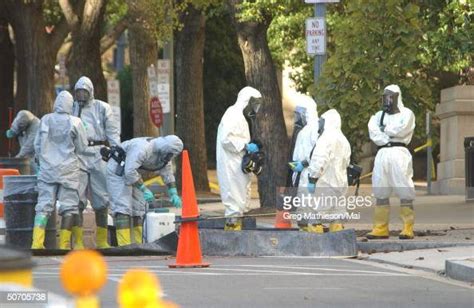By Sandy Fitzgerald
The United States is not prepared for the possibility of a biological or chemical warfare strike, according to several former federal officials, pointing to the lack of preparedness for the COVID-19 pandemic.
“We need to be prepared to be able to respond to the next crisis, whatever that might be. It may be another emerging infectious disease, it may be an intentional biochemical event, Robert Kadlec, the Health and Human Services assistant secretary for preparedness and response during the Trump administration, tells Axios. “We can’t predict that.”
By law, HHS is required to set up multiyear budgets to incorporate funding demands for the agencies that are involved in stockpiling countermeasures for health emergencies, such as the stockpile for masks and ventilators for the coronavirus pandemic.
The stockpile also stores other countermeasures such as therapeutics and equipment to be used for other biological threats, including smallpox, radiation and nuclear burns, anthrax, and more.
Congress has not been filing initiatives at recommended levels, but the most recent spending bill, however, did add more funding for the stockpile, reports Axios.
Kadlec, though, said the pandemic should have proven as a wake-up call, but it didn’t.
“We’re not learning the lessons we should that are relevant and immediately applied to something like a chem-bio event, particularly [initiated by] a nation-state, like Russia, who we know has a biological weapons program and has advanced chemical weapons,” Kadlec said.
Kadlec has helped work on a bipartisan pandemic preparedness bill through his current position working for Sen. Richard Burr, R-N.C., but said the proposed measure won’t make all necessary changes.
“What will it take for us to understand that we live in a world that these things can happen tomorrow?” he commented.
There is no immediate threat of biological or chemical warfare at this point, Axios stressed, but there is concern that Russia may end up using such weapons is pointing to the need for the United States to be ready for such scenarios.
“When [Vladimir Putin] rattles the saber over bio, nuclear, and chemical weapons, we better sit up and take note and be ready,” said former Rep. Greg Walden, R-Ore., who chaired the House committee with jurisdiction over public health and preparedness.
However, the United States is “far short” of seeing such challenges in the same way it looks at more traditional national security issues, former Senate Majority Leader Tom Daschle, D-S.D., warned.
“I think it’s the future of the real threats we face in national security,” Daschle said.
The items kept in the federal stockpile, and how much is stored, are determined by the federal government and depend on threat levels, but the investment hasn’t kept up with what the government says is needed, warned another former official.
“We are absolutely not close to meeting requirements. Ever,” a former HHS official who worked in the Trump administration but whose name wasn’t reported, told Axios. “We’ve routinely not been as prepared as our own government says we should be.”
Walden said the federal stockpiles do have the treatments and antidotes needed to fight back against smallpox and other threats, but there is a question about whether there are enough supplies, if what’s available is not expired, and if it can be deployed “effectively in time to prevent a catastrophe.”
Read More From The PatriotAmerican
“Are we set up to do drive-through distribution of whatever the medicine is in a major city?” said Walden. “We saw how hard that was to pull off. Having lived through [the pandemic] now, I have trouble believing we’re set up to pull this off.”


No country on earth is prepared for a biological or chemical attack. Not one!
This is very evident after 2020.
If it were ever to come to past on a mass scale, hospitals and emergency services would be over whelmed and there would have to be mass graves and cremations. Only after communities that were affected started to recover.